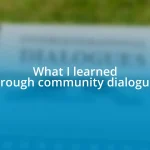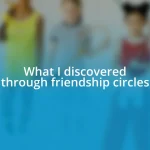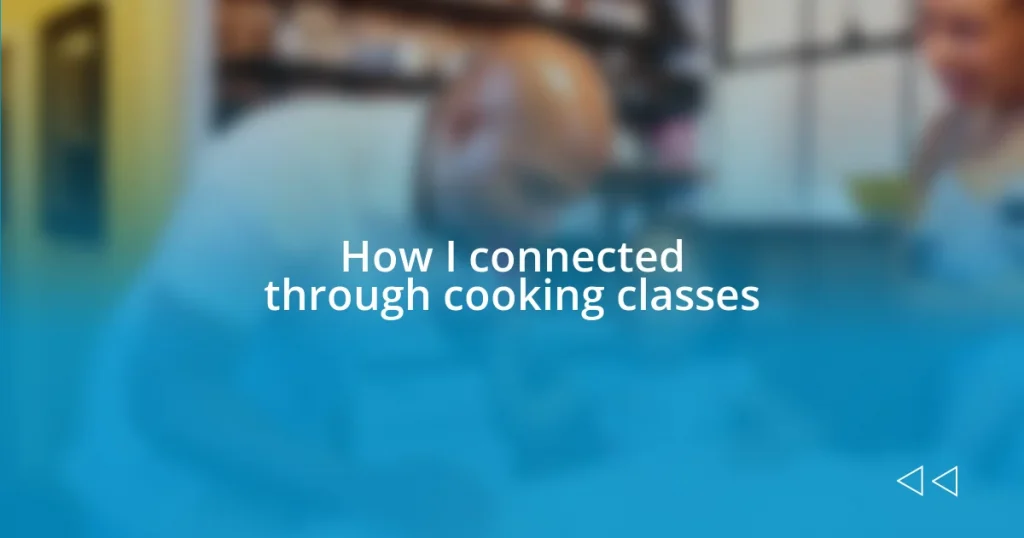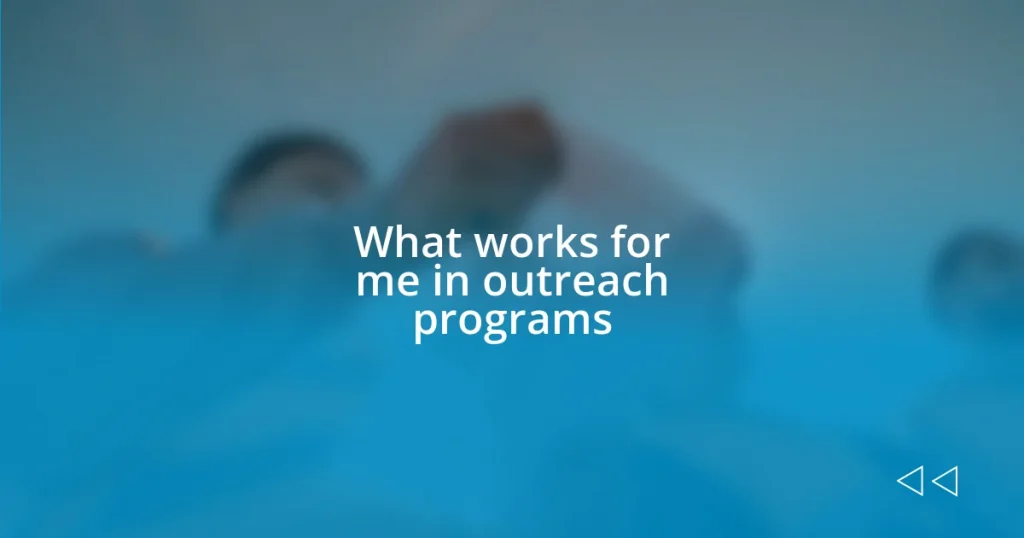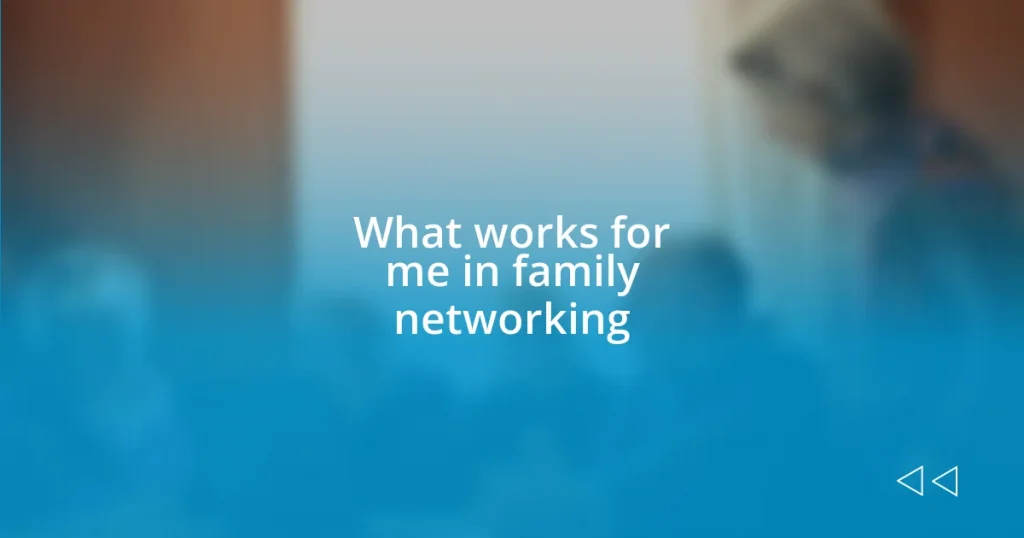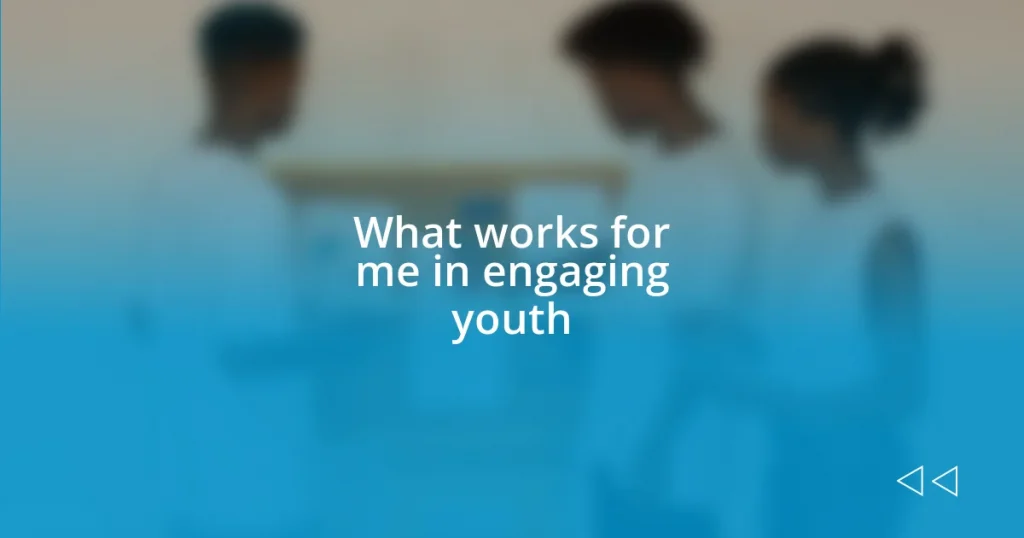Key takeaways:
- The journey into cooking classes transforms fear and self-doubt into confidence and creativity through hands-on experience and community support.
- Finding the right cooking class involves considering factors like skill level, cuisine focus, and instructor experience, which can enhance personal engagement and learning.
- Cooking fosters friendships and connections, allowing participants to bond over shared experiences and cultural exchanges, ultimately enriching their culinary journey.
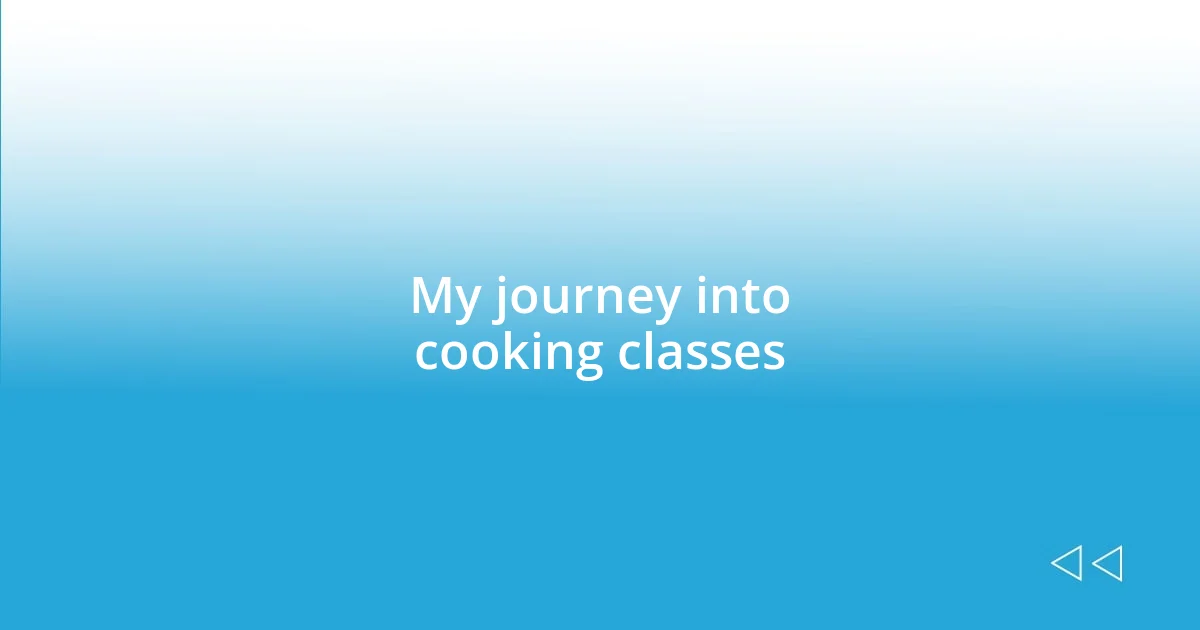
My journey into cooking classes
I still remember my first cooking class like it was yesterday. The smell of fresh herbs and sizzling onions filled the air, and I felt a mix of excitement and nervousness as I stood in front of the chef. The question I kept asking myself was, “Can I really do this?” But as I chopped and sautéed, I discovered that cooking was not just about following recipes; it was a creative outlet where I could express myself.
As the weeks went by, my confidence grew alongside my skills. One memorable moment was making my first homemade pasta. I was amazed by how simple ingredients transformed into something beautiful and delicious. This experience taught me that cooking can evoke emotions and create connections, whether it’s bonding over a meal with friends or rekindling memories of family gatherings around the dinner table.
Looking back, I can’t help but wonder how many people shy away from cooking because of fear or self-doubt. I used to be one of them, but through attending classes, I found not just culinary techniques but also a supportive community. It’s incredible how sharing a passion for food can bridge gaps between strangers and turn novices into confident cooks.
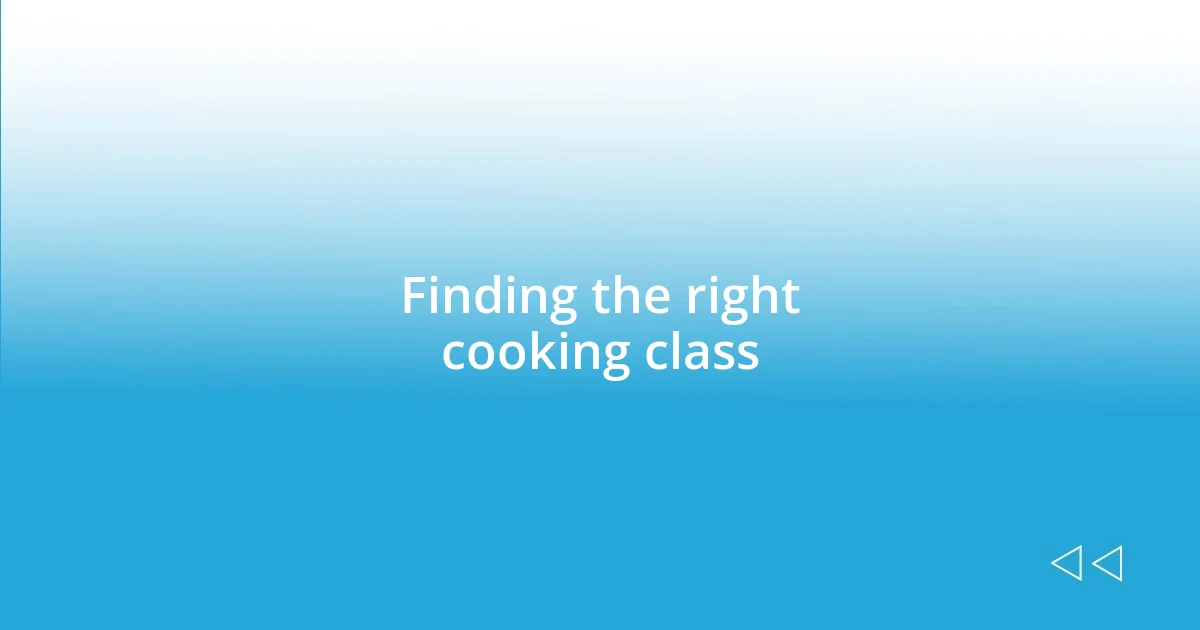
Finding the right cooking class
Finding the right cooking class can feel like searching for a needle in a haystack. Initially, my focus was solely on skill level – I wanted a beginner class that wouldn’t overwhelm me. However, it quickly became clear that finding a class aligned with my culinary interests was just as crucial. I remember trying a baking class once, and while I enjoyed the sweet treats we made, I realized my heart truly belonged to savory dishes.
To help you navigate your options, here are some key factors to consider:
- Skill Level: Ensure the class matches your experience, whether you’re a total novice or looking to refine specific skills.
- Cuisine Focus: Explore different cuisines; find one that excites you, be it Italian, Thai, or French.
- Class Size: Smaller classes often provide more personal attention, which I found invaluable.
- Instructor Experience: Researching the chef or instructor’s background can give you insight into their teaching style.
- Location and Format: Consider if you prefer in-person classes in a local kitchen or online formats for convenience.
By reflecting on these aspects, I discovered a cooking class that not only honed my skills but also ignited my passion for food. It’s all about creating a meaningful connection to the culinary world!
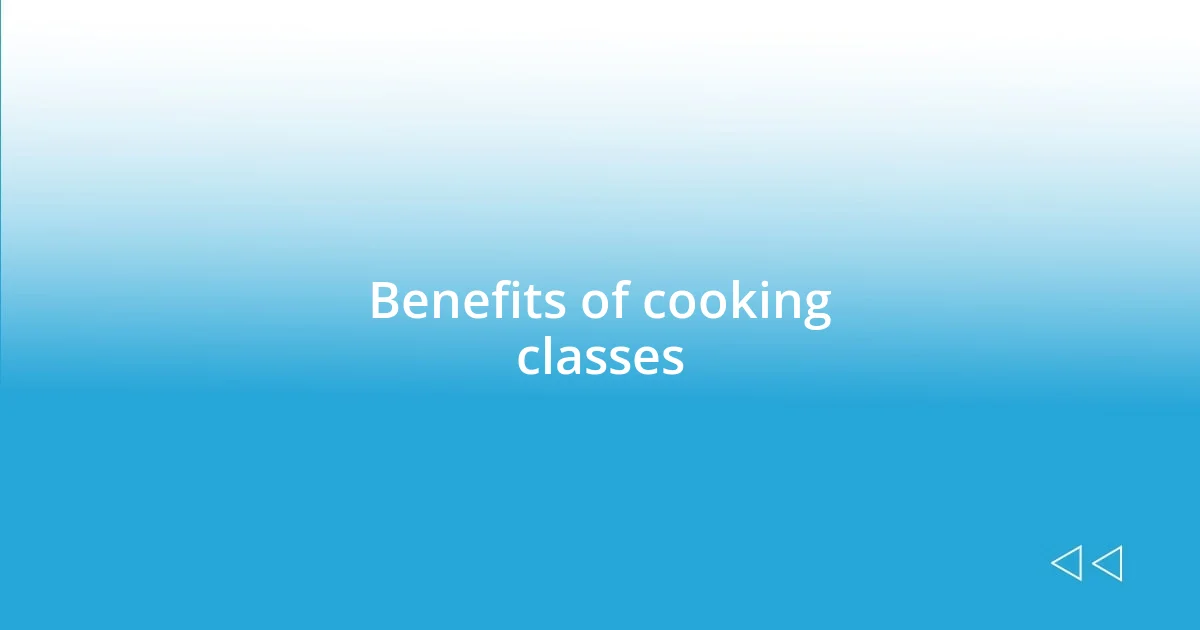
Benefits of cooking classes
Cooking classes offer a wealth of benefits that extend beyond just learning how to prepare a meal. One major advantage is increased confidence in the kitchen. I vividly remember the first time I successfully executed a complicated recipe after a few classes. It felt empowering, almost as if I had conquered a small mountain. That sense of achievement not only made me eager to try more difficult dishes but also formed a positive self-image connected to my cooking abilities.
Additionally, these classes foster a sense of community and connection. I’ve met individuals from diverse backgrounds, all coming together to share their love for food. One evening, while making sushi, I struck up a delightful conversation with a fellow participant. We exchanged stories about our cultures and cooking traditions, forming a bond that went beyond the shared experience of rolling rice and vegetables. The supportive atmosphere helped me realize that cooking is about collaboration and building relationships.
Finally, cooking classes introduce us to new flavors and cooking techniques that can enhance our culinary repertoire. I remember the joy of learning how to properly handle spices during an Indian cooking class. It opened my palate to flavors I had never tried before. This not only invigorated my home cooking but also pushed me to explore and be adventurous in the kitchen, ultimately leading to a more fulfilling culinary journey.
| Benefit | Description |
|---|---|
| Confidence Building | Classes provide the skills needed to tackle new recipes, boosting self-esteem. |
| Community Connection | Meet people who share your passion and build relationships through food. |
| Flavor Exploration | Learn about new ingredients and techniques, expanding your culinary horizons. |
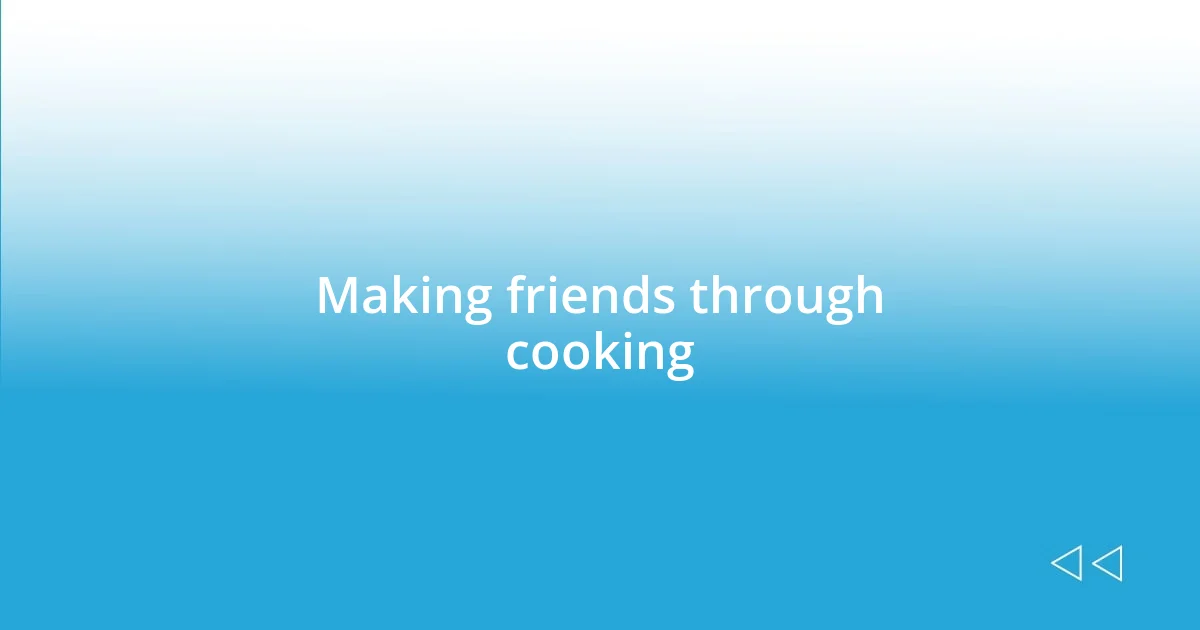
Making friends through cooking
In the heart of every cooking class, there’s an opportunity to connect with others in a truly unique way. I remember one particular evening where we were all huddled around the stove, attempting to master the delicate art of risotto. As we stirred and chatted, laughter filled the air. It felt like we were not just learning to cook but also weaving new friendships. Have you ever shared a meal with someone you just met and felt an instant bond? It’s a magical experience that cooking classes can foster effortlessly.
During another class centered around Italian cuisine, we were tasked with making homemade pasta. I struck up a conversation with a woman beside me who shared a similar passion for cooking but had pivotal differences, as she hailed from a completely different culture. As we worked together, rolling out the dough and cutting it into shapes, we exchanged recipes and stories from our respective families. Those connections made the atmosphere feel warm and welcoming. It’s incredible how food, a common love, can bridge gaps between strangers!
I’ve found that at the end of each class, it’s not just the dish we created that holds value, but the friendships forged in the process. Back home, I still keep in touch with many of my cooking classmates. We occasionally host potlucks where we bring dishes inspired by what we’ve learned. Isn’t it wonderful to think that a simple desire to learn something new can lead to lasting friendships? Cooking truly becomes a canvas for connection, isn’t it?
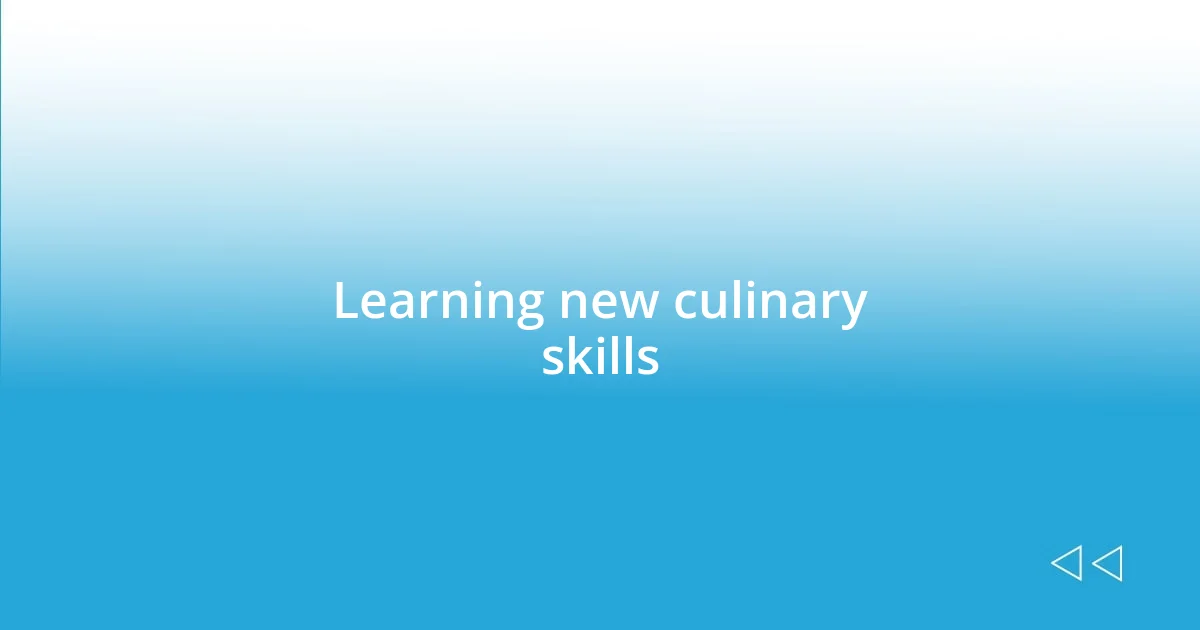
Learning new culinary skills
Every cooking class I attended was like unlocking a new door to culinary possibilities. I remember the first time I learned how to fillet a fish; it felt like a rite of passage. Suddenly, a whole new world of seafood opened up to me. Do you remember the first time you attempted a technique that seemed daunting? That exhilarating mix of fear and excitement pushes us to grow and expand our cooking skills.
The variety of culinary techniques I encountered in classes often left me in awe. I fondly recall a lesson on emulsifying sauces, where I fumbled at first but gradually saw my sauce transform before my very eyes. There’s something magical about the way ingredients combine to create something completely new. Have you ever had that “aha!” moment in the kitchen? It’s these learning experiences that elevate our confidence and skills, allowing us to tackle dishes we once thought were too advanced.
As I delved into baking classes, I discovered the precision required in measuring and technique. The process taught me patience and the art of attention to detail. I still think back to my first attempt at soufflé—what a beautiful disaster that was! The flopped dish became a running joke, yet it encouraged me to try again without fear of failure. Isn’t it fascinating how these culinary lessons translate into life skills, reminding us that practice really does make perfect?

Experiences that shaped my journey
There was a moment during a street food workshop that truly deepened my appreciation for culinary culture. As we learned to make savory Thai spring rolls, the instructor shared stories of his childhood and the bustling markets of Bangkok. I felt transported, almost as if I could taste the vibrant energy of those streets through his words. It made me realize how cooking is so much more than a task; it’s a journey through time and place. Have you ever felt a dish evoke a memory, weaving together past and present?
Another transformative experience occurred when I tried my hand at French pastries. Let me tell you, the first attempt at making macarons felt like an uphill battle. Each failed batch was a lesson in resilience. Yet, with each attempt, my determination grew, pushing me to understand the science behind the delicate balance of ingredients. Isn’t it interesting how in baking, even a slight misstep can lead to vastly different results? Those moments taught me to embrace failure and see it as a stepping stone, rather than an obstacle.
One evening in a global cuisines class, we prepared traditional Moroccan tagine. I’ll never forget the warmth of spices filling the room as they simmered. It was more than just cooking; it was a vibrant conversation about traditions and meanings behind the dishes we prepared. I felt a sense of belonging, a reminder of how food can unite diverse backgrounds. In those instances, I understood that sharing meals isn’t just about satisfying hunger; it’s about nourishing connections that enrich our lives. Have you experienced that inexplicable bond over shared flavors and stories?
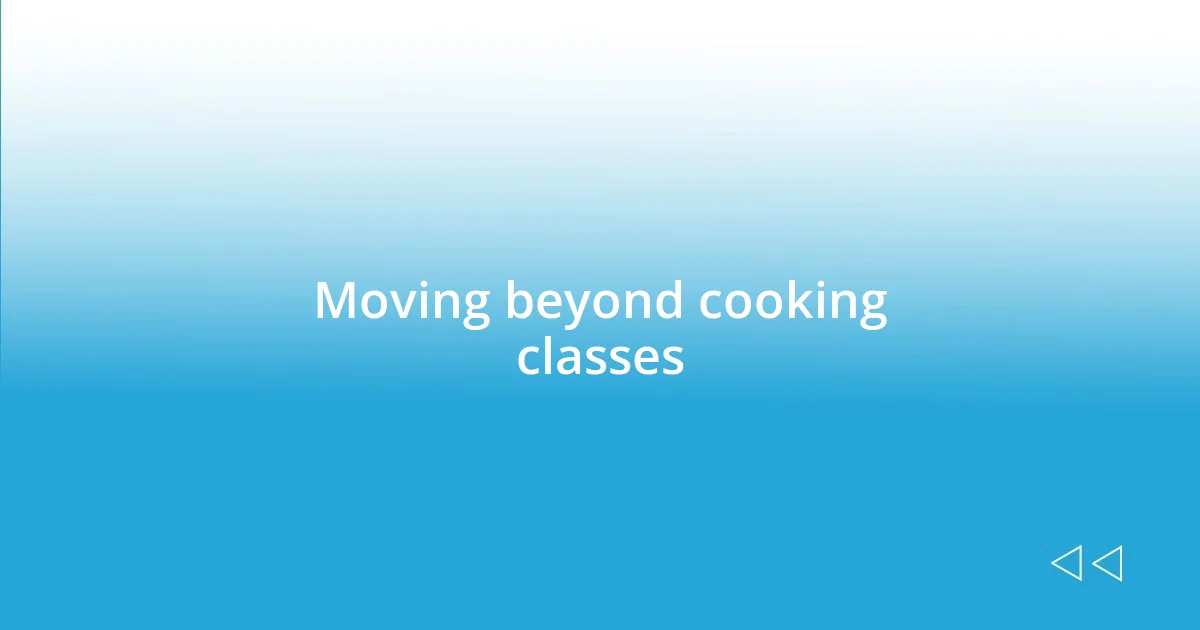
Moving beyond cooking classes
The journey of cooking doesn’t have to end once the class is over; it can evolve into wonderful experiences outside the kitchen. For instance, after mastering pasta-making, I found myself hosting homemade pasta nights with friends. It started as a fun gathering but morphed into something deeper—sharing not just a meal but stories, laughter, and cherished memories. Isn’t it amazing how a simple act like cooking can transform social gatherings into lasting connections?
Beyond the kitchen, I discovered that my cooking experiences sparked a newfound curiosity about global cuisines. I began exploring international markets, collecting spices and ingredients that reminded me of my classes. One time, as I sifted through the vibrant colors of various spices, I felt a connection to the cultures they originated from. This didn’t just enhance my cooking; it broadened my world view. Have you ever wandered through a market and felt drawn to a particular ingredient, as if it held a secret story waiting to be uncovered?
I realized that cooking has the power to unite us in unexpected ways. A dinner party became a chance to invite people from different walks of life, sharing a meal that celebrated our unique backgrounds. In those moments, as we passed around dishes filled with flavors and tales, I grasped the true essence of what it means to connect through food. It’s a reminder that while culinary skills are essential, the relationships forged around the dining table are truly what enrich our lives. Can you think of a time when sharing a meal led to a newfound friendship?








